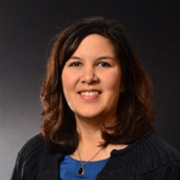Laura Edwards, State Climatologist, SDSU Extension

Please include details about your educational background and what sparked your interest in atmospheric or related sciences.
I grew up in Minnesota, outside of Minneapolis, and was first interested in severe weather as a tornado came very close to our home. In graduate school, I was employed as the Assistant State Climatologist of Maryland and found my calling! After earning my MS in Meteorology from University of Maryland, I worked at the Western Regional Climate Center in Reno, NV. I have been with South Dakota State University Extension since 2011, where I was first a Climate Field Specialist. I have been the South Dakota State Climatologist since 2017.
What was your first job in the field and how did you end up in the job you are in now?
My first job in the field was as the Assistant State Climatologist in Maryland. I also was a Teaching Assistant for a global environmental change undergraduate course at the University of Maryland. Both of these experiences led me towards an applied climatologist position for which science communication with non-scientists is important.
What opportunities did you pursue that you knew would be beneficial to securing a job in the profession?
While at the Western Regional Climate Center, I tried to shadow my supervisor, and meet people at meetings and conferences that we attended together. Networking with other professionals in our applied climate community was key to being successful professionally and finding my next job. I also tried to work on grants and projects that combined my scientific and personal expertise and interests.
What other courses/skills beyond the required math and science courses do you think would be the most helpful to individuals wanting a career in your profession?
I work a lot with journalists and media now. Learning how to get your points across clearly, in plain language, on live radio or media is important. I also write a lot of articles for online publication and print media. It is a different skill to write for the public than in scientific reports or peer-reviewed articles. Social media helps me reach those who do not seek out traditional media news sources. I would encourage all students to find opportunities for science communication and to reach out and try it. This is becoming more important all the time.
What is your typical day on the job like?
Most days I get a couple of requests for past weather or climate data; questions about the long-range forecast or outlook, and what that might mean for the state's agriculture or other impacts; answer media requests for interviews; post on social media; work with research and project collaborators; do some writing for our website, news media or research-related papers.
What do you like most about your job? What is the most challenging thing about your job?
I enjoy most the connection with farmers and decision makers. In particular, I like to learn what information is most useful to them and how they access weather and climate information. In turn, I can improve how we disseminate weather and climate information that they can use.
The most challenging days are when the forecasts or outlooks are difficult to get right and have a huge impact on a community. Some other tough days are when I see individuals or communities struggling with weather or climate extremes (like flooding or drought), and there really isn't anything I can do to make it better.
Does your job allow for a good work/life balance? If not, why?
I do have somewhat flexible hours, but at the same time our team does hold some evening or weekend events to accommodate our clientele's schedule. Seeing as I have a statewide responsibility, I travel a lot but I try to maintain regular hours when I'm in the office and be home nights and weekends as much as possible.
Is there anything you wish you had done differently in your career?
I don't have any regrets so far!
What are some ‘must haves’’ on a resume if a person wants to gain employment in your field?
A strong background in scientific communication, both among our peers and with non-experts.
Listen to your audience, ask questions of them to try to understand their perspective.
Have fun and don't take yourself too seriously--everyone likes to talk about the weather casually.
Be honest, even with difficult topics.